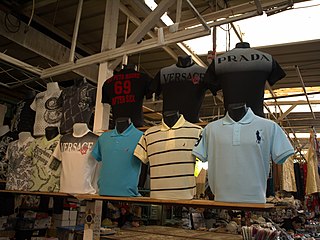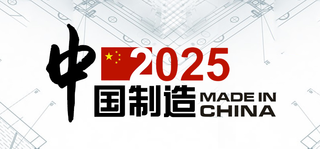E-commerce is the activity of electronically buying or selling of products on online services or over the Internet. E-commerce draws on technologies such as mobile commerce, electronic funds transfer, supply chain management, Internet marketing, online transaction processing, electronic data interchange (EDI), inventory management systems, and automated data collection systems. E-commerce is in turn driven by the technological advances of the semiconductor industry, and is the largest sector of the electronics industry.

To counterfeit means to imitate something authentic, with the intent to steal, destroy, or replace the original, for use in illegal transactions, or otherwise to deceive individuals into believing that the fake is of equal or greater value than the real thing. Counterfeit products are fakes or unauthorized replicas of the real product. Counterfeit products are often produced with the intent to take advantage of the superior value of the imitated product. The word counterfeit frequently describes both the forgeries of currency and documents as well as the imitations of items such as clothing, handbags, shoes, pharmaceuticals, automobile parts, unapproved aircraft parts, watches, electronics and electronic parts, software, works of art, toys, and movies.
A trademark is a word, phrase, or logo that identifies the source of goods or services. Trademark law protects a business' commercial identity or brand by discouraging other businesses from adopting a name or logo that is "confusingly similar" to an existing trademark. The goal is to allow consumers to easily identify the producers of goods and services and avoid confusion.

The International Chamber of Commerce is the largest, most representative business organization in the world. Its over 45 million members in over 100 countries have interests spanning every sector of private enterprise.

A sales tax is a tax paid to a governing body for the sales of certain goods and services. Usually laws allow the seller to collect funds for the tax from the consumer at the point of purchase.

Local purchasing is a preference to buy locally produced goods and services rather than those produced farther away. It is very often abbreviated as a positive goal, "buy local" or "buy locally', that parallels the phrase "think globally, act locally", common in green politics.

Organic certification is a certification process for producers of organic food and other organic agricultural products, in the European Union more commonly known as ecological or biological products. In general, any business directly involved in food production can be certified, including seed suppliers, farmers, food processors, retailers and restaurants. A lesser known counterpart is certification for organic textiles that includes certification of textile products made from organically grown fibres.

In economics, a luxury good is a good for which demand increases more than what is proportional as income rises, so that expenditures on the good become a greater proportion of overall spending. Luxury goods are in contrast to necessity goods, where demand increases proportionally less than income. Luxury goods is often used synonymously with superior goods.

The Forest Stewardship Council GmbH (FSC) is an international non-profit, multistakeholder organization established in 1993 that promotes responsible management of the world's forests via timber certification. This organization uses a market-based approach to transnational environmental policy.

On commercial products, the letters CE mean that the manufacturer or importer affirms the goods' conformity with European health, safety, and environmental protection standards. It is not a quality indicator or a certification mark. The CE marking is required for goods sold in the European Economic Area (EEA), but is also found on products sold elsewhere that have been manufactured to EEA standards.

The National LGBT Chamber of Commerce (NGLCC) is a U.S. not-for-profit advocacy group that aims to expand the economic opportunities and advancement of the LGBT business community. Its headquarters are in NW in Washington, D.C. NGLCC is the exclusive certifying body for LGBT-owned businesses known as LGBT Business Enterprises (LGBTBEs), and advocates for LGBT business inclusion in corporate and government supplier diversity programs. In October 2017, the organization changed its name from the National Gay & Lesbian Chamber of Commerce to National LGBT Chamber of Commerce to better reflect the entire LGBT business community it serves.

Etsy, Inc. is an American e-commerce company focused on handmade or vintage items and craft supplies. These items fall under a wide range of categories, including jewelry, bags, clothing, home décor and furniture, toys, art, as well as craft supplies and tools. Items described as vintage must be at least 20 years old. The site follows in the tradition of open craft fairs, giving sellers personal storefronts where they list their goods for a fee of US$0.20 per item. Beginning in 2013, Etsy allowed sellers to sell mass manufactured items.

A Certificate of Origin or Declaration of Origin is a document widely used in international trade transactions which attests that the product listed therein has met certain criteria to be considered as originating in a particular country. A certificate of origin / declaration of origin is generally prepared and completed by the exporter or the manufacturer, and may be subject to official certification by an authorized third party. It is often submitted to a customs authority of the importing country to justify the product's eligibility for entry and/or its entitlement to preferential treatment. Guidelines for issuance of Certificates of Origin by chambers of commerce globally are issued by the International Chamber of Commerce.
Erie, Pennsylvania is the Commonwealth's primary access point to Lake Erie, the Great Lakes, and the Saint Lawrence Seaway. The city developed first as a maritime center after the American Revolution, as a railroad hub during the great American westward expansion, and as an important manufacturing center during the Industrial Revolution. By the 21st century, electric locomotive building is all that remains of big industry, but smaller-scale steel and plastics manufacturers, as well as health care, insurance, tourism and recreation have emerged as Erie's new diverse mix of key industries.

The Consumer Product Safety Improvement Act (CPSIA) of 2008 is a United States law signed on August 14, 2008 by President George W. Bush. The legislative bill was known as HR 4040, sponsored by Congressman Bobby Rush (D-Ill.). On December 19, 2007, the U.S. House approved the bill 407-0. On March 6, 2008, the U.S. Senate approved the bill 79-13. The law—public law 110-314—increases the budget of the Consumer Product Safety Commission (CPSC), imposes new testing and documentation requirements, and sets new acceptable levels of several substances. It imposes new requirements on manufacturers of apparel, shoes, personal care products, accessories and jewelry, home furnishings, bedding, toys, electronics and video games, books, school supplies, educational materials and science kits. The Act also increases fines and specifies jail time for some violations.
Counterfeit consumer goods are goods, often of inferior quality, made or sold under another's brand name without the brand owner's authorization. Sellers of such goods may infringe on either the trademark, patent or copyright of the brand owner by passing off its goods as made by the brand owner. Counterfeit products made up 5 to 7% of world trade in 2013, and in 2014 cost an estimated 2.5 million jobs worldwide, with up to 750,000 jobs lost in the U.S. About 5% of goods imported into the European Union in 2013 were fakes, according to the OECD.
Iran is a member of the WIPO since 2001 and has acceded to several WIPO intellectual property treaties. Iran joined the Convention for the Protection of Industrial Property in 1959. In December 2003 Iran became a party to the Madrid Agreement and the Madrid Protocol for the International Registration of Marks. In 2005 Iran joined the Lisbon Agreement for the Protection of Appellations of Origin and their International Registration, which ensures the protection of geographical names associated with products. As at February 2008 Iran had yet to accede to The Hague Agreement for the Protection of Industrial Designs.

The Australian Made, Australian Grown logo is a registered certification trade mark logo and country of origin label that certifies that a product has been manufactured or grown in Australia. The triangular green-and-gold logo, featuring a kangaroo, was introduced in 1986. The Australian Made, Australian Grown logo is administered by Australian Made Campaign Limited (AMCL).
Recommerce or reverse commerce is the selling of previously owned, new or used products, mainly electronic devices or media such as books, through physical or online distribution channels to buyers who repair, if necessary, then reuse, recycle or resell them.

Made in China 2025 is a national strategic plan and industrial policy of the Chinese Communist Party (CCP) to further develop the manufacturing sector of China, issued by CCP general secretary Xi Jinping and Chinese Premier Li Keqiang's cabinet in May 2015. As part of the Thirteenth and Fourteenth Five-year Plans, China aims to move away from being the "world's factory"—a producer of cheap low-tech goods facilitated by lower labour costs and supply chain advantages. The industrial policy aims to upgrade the manufacturing capabilities of Chinese industries, growing from labor-intensive workshops into a more technology-intensive powerhouse.













